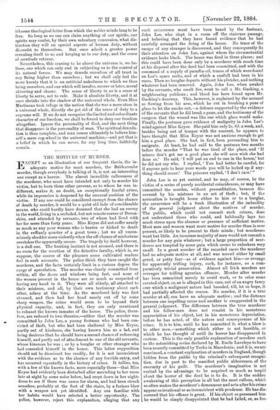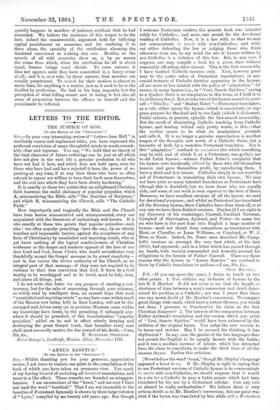THE MOTIVES OF MURDER.
EXCEPT as an illustration of our frequent thesis, the in- adequate motive for most murders, the Babbacombe murder, though everybody is talking of it, is not an interesting one except as a horror. The almost incredible callousness of the murderer, who must have intended not only to murder his victim, but to burn three other persons, as to whom he was in- different, makes it, no doubt, an exceptionally fearful crime, while its impression is deepened by the unusual position of the victim. If any one could be considered exempt from the chance of death by murder, it would be a quiet old lady of considerable means, who could hardly have dreamed that she had an enemy in the world, living in a secluded, but not remote corner of Devon- shire, and attended by servants, two of whom had lived with her for more than forty years. Miss Keyse did not suffer nearly so much as any poor woman who is beaten or kicked to death in the ruffianly quarter of a great town ; but we all uncon- sciously shudder more violently when the off-chance of misfortune overtakes the apparently secure. The tragedy by itself, however, is a dull one. The hunting instinct is not aroused, and there is no room for the exertion of the detective faculty, which is, we suppose, the source of the pleasure some cultivated readers feel in such accounts. The police think they have caught the murderer, and the facts certainly limit in a curious degree the range of speculation. The murder was clearly committed from within, all the doors and windows being fast, and none of the women present in the house are so much as suspected of having any hand in it. They were all elderly, all attached to their mistress, and all, by their own testimony about each other, asleep at the time. As the murdered lady was first stunned, and then had her head nearly cut off by some sharp weapon, the crime would seem to be beyond their physical capacity, and, in fact, they are only mentioned to exhaust the known inmates of the house. The police, there- fore, are reduced to two theories,—either that the murder was tat committed by John Lee, a young footman who had been con- victed of theft, but who had been sheltered by Miss Keyse, partly out of kindness, she having known him as a lad, and being desirous that he should have a second chance of redeeming himself, and partly out of attachment to one of the old servants, whose kinsman he was ; or by a burglar or other stranger who had concealed himself in the house. This latter supposition should not be dismissed too readily, for it is not inconsistent with the evidence as to the absence of any forcible entry, and has occurred repeatedly in the history of crime. It tallies, too, with a few of the known facts, more especially these—that Miss Keyse had evidently been disturbed after ascending to her room late at night by some noise below, had crept down in her night- dress to see if there was cause for alarm, and had been struck senseless, probably at the foot of the stairs, by a furious blow with a weapon not yet identified. Any one familiar with her. habits would have selected a better opportunity. The police, however, reject this explanation, alleging that any such occurrence must have been heard by the footman, John Lee, who slept in a room off the staircase passage, and believing that they have found evidence that he had carefully arranged the firing of the house. No trace of the escape of any stranger is discovered, and they consequently fix their attention on John Lee, against whom the circumstantial evidence looks black. The house was fired in three places; and this could have been done only by a murderer with much time at his disposal after the deed had been committed, and with the command of a supply of paraffin-oil, traces of which were found on Lee's spare socks, and of which a canfrill had been in his room. Then no burglar departs without his plunder, and nothing whatever had been removed. Again, John Lee, when awaked by the servants, who smelt fire, went to call a Mr. Gasking, a neighbouring publican ; and blood has been found upon Mr. Gasking's doorway. This, however, is explained by the accused as flowing from his arm, which he cut in breaking a pane of glass to let the smoke out,—a defence supported by the evidence of the servants that he did break a pane, and the testimony of the surgeon that the wound was like one which glass would make. Finally, the postman gave evidence of malignity in John Lee's mind against Miss Keyse. She paid him only 2s. 6d. a week, and, besides being out of temper with the amount, he appears to have thought that Miss Keyse was not anxious enough to get him a good place. She had, in fact, been persuading him to emigrate. At least, he had said to the postman two months before the murder "That he was tired of the place, and If missus don't get me a good place she will soon wish she bad done so.' He said, I will put an end to one in the house,' but he did not say who. I replied, You had better be careful, for if anyone gets to hear your words you will be locked up if any- thing should occur.' The prisoner replied, I don't care.'" John Lee is as yet untried, and he may, of course, be the victim of a series of purely accidental coincidences, or may have committed the murder, without premeditation, because dis- covered by his mistress in an act of theft ; but, if the accusation is brought home either to him or to a burglar, the occurrence will be a fresh illustration of the imbecility of the general judgment about the motives of murder. The public, which could not commit such crimes, does not understand those who could, and habitually lays too much stress upon the absence or presence of sufficient motive. Most men and women want more motive for murder than is ever present, or likely to be present to their minds ; but murderers want but little. An immense majority of men would not commit a murder for any gain whatever ; but a large proportion of mur- derers are tempted by some gain which seems to onlookers very small. In a great number of the recorded cases the murderer had no adequate motive at all, and was moved either by small greed, or petty fear—as of evidence against him—or revenge for apparently trifling injury, such, for instance, as a com- paratively trivial prosecution. Almost all Irish murders are revenges for trifling agrarian offences. Murder after murder has been committed merely to avoid work, or to seize some coveted object, or, as is alleged in this case, out of an angry fancy over which a malignant nature had brooded, till, let us hope, it had partially affected the reason. No murder, if it is a true murder at all, can have an adequate motive ; and the distance between one impelling cause and another is exaggerated in the general judgment. The difference between the true murderer and his fellow-men does not consist in his monstrous appreciation of his object, but in his monstrous depreciation, before he has acted, of the nature and consequences of his crime. It is to him, until he has committed it, what a blow is to other men,—something which either is not horrible, or which he has thought of until its horror has disappeared in custom. This is the only possible explanation of murders such as the astonishing series declared by M. Emile Laveleye to have been recently committed by Turks in Macedonia; and it is, we are convinced, a constant explanation of murders in England, though hidden from the public by the criminal's subsequent recogni- tion, due in part to the manifest public abhorrence, of the enormity of his guilt. The murderer's imagination is not excited by the advantage to be acquired so much as torpid about the horror of the deed he is to do. It is the sudden awakening of this perception in all but the most callous, which so often makes the murderer's demeanour and acts after his crime appear so irrational or so inconsistent with prudence. He has dis- covered that his offence is great. If his object so possessed him he would be simply disappointed that he had failed, or, as he-
quently happens in murders of jealousy, exultant that he had succeeded. We believe the existence of this torpor to be the best, indeed the unanswerable, argument both for inflicting capital punishment on assassins, and for confining it to them alone, the specialty of the retribution alarming the deadened conscience as nothing else can. Murder, as the records of all wild countries show us, is by no means the crime from which, when the retribution for all is about equal, human beings most shrink. To some natures it does not appear, until they have committed it, a heavy crime at all ; and it is, as a rule, by those natures that murders are usually perpetrated. To search for their motives is almost to waste time, for anything is a motive, just as it used to be to the duellist by profession. He had in his long impunity lost the perception of what killing meant, and in losing it lost also all sense of proportion between the offence to himself and the punishment he inflicted.



































 Previous page
Previous page